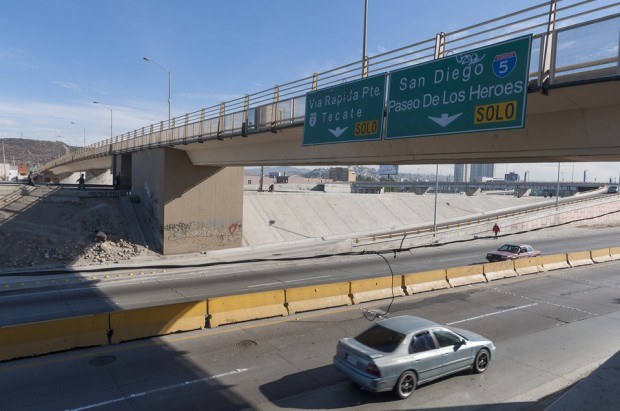President Enrique Pena Nieto is giving the car insurance market a boost with a plan to mandate policies on federal highways in Mexico, where almost three in four drivers lack coverage.
Congress approved the proposal in April, and administration officials have said they’re working to implement the rules this year, without giving a start date. Requiring coverage in a country where the government estimates 73 percent of drivers to be uninsured would boost sales for Mexico City-based Qualitas Controladora SAB and competitors including Paris-based AXA SA and Grupo Financiero Inbursa SAB, the lender controlled by billionaire Carlos Slim.
The rules will increase demand for policies and may eventually lead to stricter laws compelling coverage on all roadways, according to Andres Audiffred Alvarado, an analyst with Banco Ve Por Mas SA. It also will help fuel a 49 percent rally this year in the shares of Qualitas, the country’s biggest insurer by market share, he said.
“It’s an important catalyst,” Audiffred Alvarado said by phone from Mexico City. “There’s a great opportunity for growth given the low penetration of insurance in the country.”
While the law still allows uninsured vehicles on local streets, drivers caught on federal roads or bridges without coverage will face fines of as much as 2,590 pesos ($198). That’s the equivalent of 40 days’ earnings at the local minimum wage. Representative Jesus Gerardo Cortez Mendoza of the opposition National Action Party first proposed the change in October 2010.
‘Culture of Insurance’
The Finance Ministry estimated in a document published May 28 that 27 percent of automobiles are insured in Mexico. That compares with coverage levels above 75 percent in Chile, Colombia, Argentina and Brazil, according to the government.
Qualitas surged 55 percent last year, fueled in part by the congressional approval of the legislation and its publication on May 21 in the government’s federal gazette, the final step required in Mexico to make a law official. Shares of AXA, which has operations in 57 countries, advanced 51 percent in 2013. Mexico City-based Inbursa fell 5.8 percent.
A press official with the Finance Ministry, which is working on the rollout, declined to comment.
The new law is “pushing the culture of insurance, and that obviously increases the market,” Jose Juan Carreno, an analyst with Corporativo GBM SAB, said in a telephone interview from Mexico City. “It’s positive for the industry in general.”
Profit Drop
Enrique Mendoza, an analyst with with Grupo Financiero Interacciones SAB, said implementation will remain a challenge as Mexico tries to get more drivers insured, and the nation is still years away from legislation applying to all roads.
“It’s going to be difficult” to enforce the law, Mendoza said in a telephone interview from Mexico City. He estimated that the bill may extend coverage to half of Mexico’s drivers at most, and the country will depend in part on state-level legislation to ensure the market continues to grow.
While he recommends buying Qualitas, Mendoza forecasts an increase of just 16 percent this year, with a target price of 37 pesos. It rose 0.6 percent to 31.83 pesos yesterday.
Qualitas’s net income fell 42 percent to 180 million pesos in the third quarter, which the company attributed in part to outstanding auto claims from hurricanes that struck the country earlier in 2013, according to a report on its website.
State Laws
The insurer “applauds all measures of this type” and plans to create products tailored to meet the government requirement once the final details are published, Alejandro Melendez, Qualitas’s head of investor relations, said by phone from Mexico City.
The states of Morelos and Baja California started requiring insurance for all vehicles last year, while Jalisco and Sinaloa are close to implementing similar measures, according to Melendez.
Qualitas increased its auto insurance policies by 18 percent in the third quarter to 2.21 million, according to a statement on its website. The insurer, which uses cash to buy government and corporate debt, also made a 4.8 percent return on its investments during the period.
“The government is getting behind this effort,” Ve Por Mas’s Audiffred Alvarado said. “The company is having a strong performance in insurance, and it’s performing well in terms of its investments.”





















 AIG, Chubb Can’t Use ‘Bump-Up’ Provision in D&O Policy to Avoid Coverage
AIG, Chubb Can’t Use ‘Bump-Up’ Provision in D&O Policy to Avoid Coverage  Flood Risk Misconceptions Drive Underinsurance: Chubb
Flood Risk Misconceptions Drive Underinsurance: Chubb  RLI Inks 30th Straight Full-Year Underwriting Profit
RLI Inks 30th Straight Full-Year Underwriting Profit  Earnings Wrap: With AI-First Mindset, ‘Sky Is the Limit’ at The Hartford
Earnings Wrap: With AI-First Mindset, ‘Sky Is the Limit’ at The Hartford 
